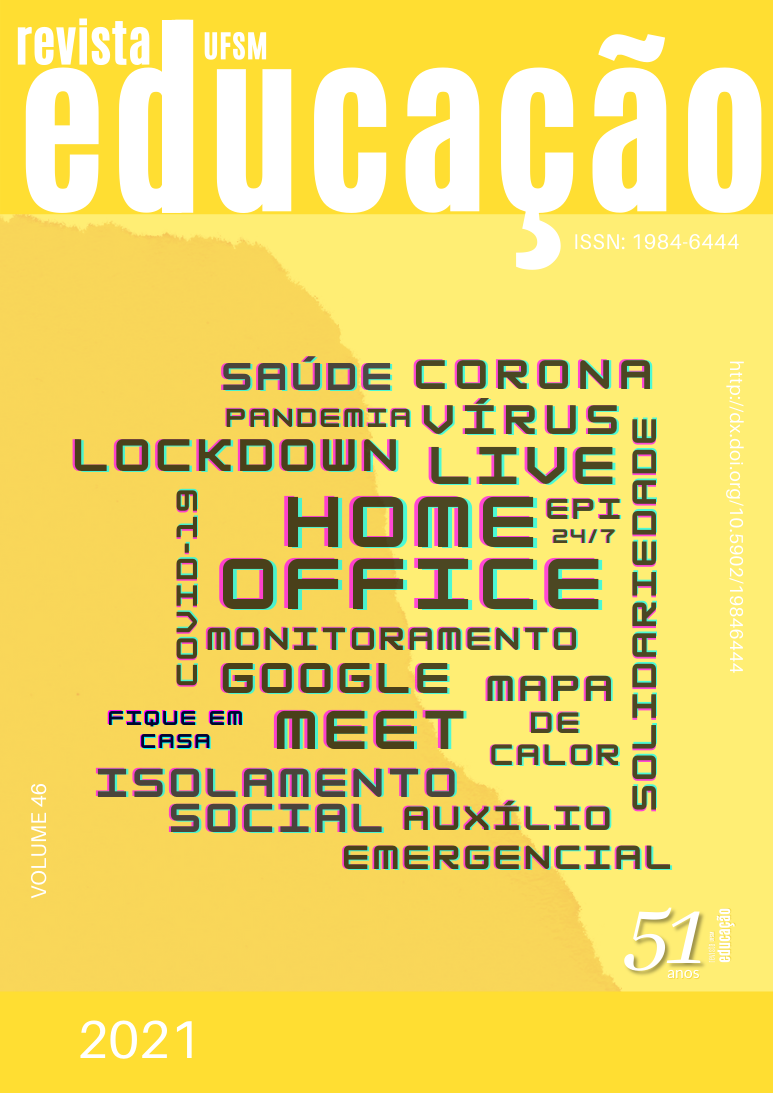Experiência, Juventude e o estar-junto em processos de aprendizagem em dança: por uma Pedagogia Performativa
DOI:
https://doi.org/10.5902/1984644444577Resumo
Este trabalho parte de reflexões sobre experiências docentes no curso de Licenciatura em Dança do Instituto Federal de Goiás/ Campus Aparecida de Goiânia, no contexto específico das disciplinas Ateliê de criação em dança I e II, onde propõem-se o estudo e vivências de diferentes acervos de dança e seus processos de ensino-aprendizagem a partir da criação artística como eixo norteador das relações entre os sujeitos e o estar-junto como paradigma ético e estético. Metodologicamente trabalhamos com a revisão de literatura que tenta dar conta das questões que envolvem a dança e a Pedagogia performativa levando em consideração as experiências nos Ateliês de criação. A presente reflexão aponta para a possibilidade da construção de novos olhares em torno dos saberes formativos na trajetória a partir da perspectiva da Experiência e da Pedagogia Performativa pensadas em contextos de Juventude. Tais processos são experimentados em uma Instituição Pública de Ensino que se compromete com a problematização e a recriação de práticas específicas e modos de ser no seio dos diversos grupos sociais. O contato sistemático e criativo com a diversidade cultural presente nesses acervos de dança a partir da utilização de metodologias coletivas e participativas sob a perspectiva da Pedagogia Performativa tem contribuído para um processo sistemático e multidimensional orientado à formação do sujeito de direito e a promoção de uma socialidade ativa e participante.
Referências
FREIRE, Paulo. Educação como prática da liberdade. 25. ed. São Paulo: Paz e Terra, 2001. 158 p.
FREITAS, M.V. (Org.) Juventude e adolescência no Brasil: referências conceituais. São Paulo: Ação Educativa, 2005.
GUIMARÃES et al. Projeto Pedagógico do Curso (PPC) da Licenciatura em dança do IFG. Aparecida de Goiânia, 2018.
ICLE, Gilberto; BONATTO, Mônica Torres. Por uma pedagogia performativa: A escola como entrelugar para professores‑performers e estudantes‑performers. Cad. Cedes, Campinas, v. 37, n. 101, p. 7-28, jan.-abr., 2017
LARROSA, Jorge. Tremores: escritos sobre experiência. Trad. Cristina Antunes e João Wanderlei Geraldi. Belo Horizonte: Autêntica, 2015.
LARROSA, Jorge. Notas sobre a experiência e o saber da experiência. Revista Brasileira de Educação. Rio de Janeiro: Jan/Fev/Mar/Abr, nº19, 2002, p.20-28.
MAFFESOLI, Michel. Homo eroticus: comunhões emocionais. Rio de Janeiro:Forense, 2014.
MAFFESOLI, Michel. O tempo das tribos: o declínio do individualismo nas sociedades pós-modernas. 4ªed. Rio de Janeiro: Forense Universitária, 2006.
MARQUE, Isabel. Linguagem da Dança: arte e ensino. São Paulo: Digitexto, 2010.
MOLINA, Alexandre José. Dança, formação artística e o conceito de experiência. In: V Congresso Nacional de Pesquisadores em Dança, ANDA, 2018, Manaus. Anais do V Congresso Nacional de Pesquisadores em Dança. Manaus: 2018, p. 2-20.
PALUDO, Luciana. O lugar da coreografia nos cursos de graduação em Dança do Rio Grande do Sul. 2015 Tese (Doutorado em Educação) – Programa de Pós-Graduação em Educação, Faculdade de Educação, Universidade Federal do Rio Grande do Sul, Porto Alegre, 2015.
PETRONILIO, Paulo. “LUGAR DE FALA”: O GRAU DA PERFORMANCE E OUTRAS HETEROTOPIAS. Guará, Goiânia, v. 6, p. 39-59, jan./dez. 2016.
PINEAU, Elyse Lamm. Nos Cruzamentos Entre a Performance e a Pedagogia: uma revisão prospectiva. Rio Grande do Sul: Educação e Realidade, 2010.
PORTELA et al. Os saberes da experiência e a construção da poética docente para o ensino de arte. Comunicações. Piracicaba: jan.-abr, nº1, 2016, p. 225-238.
RIBEIRO, Luciana Gomes. A base nacional comum curricular foi aprovada. E agora? Como fica o ensino das artes? Boletim da FAEB. Goiânia: Maio, nº1, 2018, p.5-13.
SCHECHNER, R; Icle, G; Pereira, M. O que pode a Performance na Educação? Uma entrevista com Richard Schechner. Rio Grande do Sul: Educação e Realidade, 2010.
VIANNA, Klauss. A dança. 3.ed. São Paulo: Summus, 2005.
Publicado
Como Citar
Edição
Seção
Licença

This work is licensed under a Creative Commons Attribution-NonCommercial 4.0 International (CC BY-NC 4.0)
Declaramos o artigo _______________________________ a ser submetido para avaliação o periódico Educação (UFSM) é original e inédito, assim como não foi enviado para qualquer outra publicação, como um todo ou uma fração.
Também reconhecemos que a submissão dos originais à Revista Educação (UFSM) implica na transferência de direitos autorais para publicação digital na revista. Em caso de incumprimento, o infrator receberá sanções e penalidades previstas pela Lei Brasileira de Proteção de Direitos Autorais (n. 9610, de 19/02/98).
_______________________________________________________
Nome completo do primeiro autor
CPF ________________






